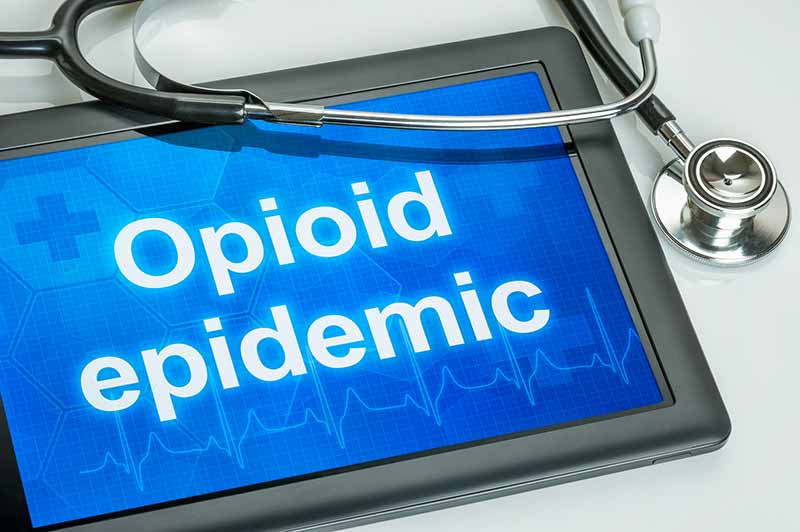A New York doctor was charged with second-degree murder this month for prescription practices that allegedly led to the opioid-related deaths of five patients. While opioid-related murder charges against prescribing doctors are still relatively rare, prosecutors around the country are increasingly pursuing criminal charges against physicians in connection with overdose deaths as the opioid crisis continues. For a 12-month period ending in May 2020, more than 81,000 drug overdose deaths occurred in the United States, the highest number ever recorded in a 12-month period, according to the Centers for Disease Control (CDC), which noted the pandemic may have exacerbated opioid abuse.
The New York Case
Dr. George Blatti, 75, a general practitioner in Long Island, N.Y., was arraigned on five counts of murder in connection with the deaths of five patients from 2016 to 2018. Prosecutors said it was the first time a doctor had been charged under New York State law with murder in the second degree under the theory of depraved indifference to human life. If convicted of the top charge, the defendant faces up to 25 years to life in prison. “This doctor’s prescription pad was as lethal as any murder weapon,” Nassau County District Attorney Madeline A. Singas said in a statement announcing the charges. “We allege that Dr. Blatti showed depraved indifference to human life, total disregarded for the law, his ethical obligations, and the pleas of his patients and their family members when he prescribed massive quantities of dangerous drugs to victims in the throes of addiction, ultimately killing five patients who entrusted him with their care.”
A 2018 investigation into opioid overdoses, both fatal and non-fatal, revealed certain individuals had an inordinate number of opioid prescriptions written by Dr. Blatti, who had no specialized training or accreditation in pain management. Dr. Blatti saw patients in a makeshift storefront office, a former Radio Shack, and after losing access to that space, allegedly met patients in his car and prescribed medications with no examinations or medical history review. Other allegations say he prescribed opioid painkillers at patients’ requests to individuals with whom he had never met or spoken.
The defendant was arrested in 2019 on 54 counts, but the investigation into his conduct continued, assisted by the cooperation of several victims’ family members. Prosecutors say they uncovered “more egregious abuse and an unconscionable, depraved disregard for human life,” leading to the murder charges. They say he knew and appreciated the deadly danger in which his actions placed his patients, yet he continued to fuel their addiction. Dr. Blatti also allegedly ignored repeated warnings from pharmacists and payers, prosecutors say. Dr. Blatti, who voluntarily surrendered his medical license in 2019, pled not guilty to all charges.
Other Murder Cases
In 2020, there were 50 drug-related criminal cases against doctors in the U.S., according to reporting by the New York Times. In recent years, a few doctors have been convicted of murder or manslaughter in opioid-related cases. A California doctor was found guilty of three counts of second-degree murder in 2015 and sentenced to 30 years to life for prescribing large amounts of dangerous drugs to patients with no legitimate need, resulting in three overdose deaths. Prosecutors said she sometimes failed to keep medical records of visits or prescriptions and faked records when authorities investigated. A New Jersey doctor who ran a weekly pain clinic in New York and did most of his business in cash was convicted of manslaughter and sentenced in 2014 to more than 10 years in prison for the overdose deaths of two patients. Evidence presented at trial showed the doctor ignored signs that his patients were abusing drugs, and that he continued to give them prescriptions even after family members and other doctors begged him to stop.
Not all cases against doctors have resulted in conviction. Last year, a California pain management specialist who had been charged with second-degree murder in connection with the overdose deaths of four patients in 2016 and 2017 was acquitted of charges in two of the deaths, while the jury could not reach a decision in the others. During the trial, prosecutors referenced derogatory entries the physician made about his patients in his journal, arguing it demonstrated his careless indifference for his patients’ lives. Attorneys for the defendant accused the prosecution of a witch hunt against his client at a time when the medical industry was shifting its stance regarding opioid prescribing practices.
Physician Groups Weigh in on the Opioid Crisis
Physicians aggressive actions to fight the epidemic have had a significant impact on prescribing practices according to a letter written by the American Medical Association (AMA) to the CDC in June 2020. Opioid prescriptions declined by 33 percent, or more than 80 million prescriptions, from 2013 to 2018, the group wrote. Nearly 2 million physicians and other health care professionals are registered to use state-based prescription drug monitoring programs, and in 2018 more than 700,000 physicians and other health care professionals completed medical education trainings and accessed other educational resources on opioid topics. “The nation no longer has a prescription opioid-driven epidemic,” the group wrote, noting a shift to a much more dangerous epidemic dominated by heroin, illicitly manufactured fentanyl, fentanyl analogs, and stimulants.
Not so fast, says Physicians for Responsible Opioid Prescribing (PROP). The group of physicians and patient advocates with expertise in pain medicine penned a letter to the AMA last month criticizing its stance that the opioid epidemic is no longer driven by prescribed opioids. “Medically prescribed opioids remain a common gateway to illicit opioid use and are themselves frequent causes of opioid addiction and overdose, even if illicit opioids currently cause the greater number of deaths,” PROP wrote.
The group calls for policymakers to institute regulations limiting long-term opioid prescribing, saying the drugs are most helpful when used in the short term.

